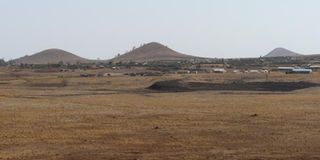Hurri Hills Primary school in northeast Kenya faces closure water shortage

A view of Hurri Hills Village in North Horr, Marsabit County, on March 5, 2015. PHOTO | DAVID MUCHUI | NATION MEDIA GROUP
What you need to know:
- Ms Dibo Abudho said that children and pregnant women had been hit hardest by the water shortage.
- The nearest boreholes are at Maikonna and Kalacha townships, which are over 60 kilometres away.
Hurri Hills Primary School in North Horr Sub-County risks being closed over a biting water shortage that has left locals contemplating relocating from the area.
Pastoralist Community Initiative and Development Assistance programme Coordinator Wario Guyo said residents of Hurri Hills have been relying on rain and mist harvesting to sustain their subsistence farming and livestock keeping over the years.
“Hurri Hills has been (an oasis) in the middle of the desert but it is now desolate. The nearest boreholes are at Maikonna and Kalacha townships, which are over 60 kilometers away,” Mr Guyo told Nation.co.ke.
Several wells in the area have dried up due to a prolonged drought. Underground water tanks that the residents have been relying on have also dried up.

Mr Mohamed Shariff, a resident of Hurri Hills, points to a 70,000 litre-capacity underground water tank that the locals have been relying on but which has now dried up. PHOTO | DAVID MUCHUI | NATION MEDIA GROUP
A resident of Hurri Hills, Mr Dacho Helle, lamented that every household gets 80 litres of water per week, which cannot sustain their domestic needs.
“The County government has assigned one water bowser to Hurri Hills. The bowser delivers water twice per week and each household is allowed to fetch only 40 litres to serve two days. The water is hardly sufficient to serve people and livestock,” Mr Helle said.
NEMA
He said residents can no longer afford to pay Sh17,000 required to transport water.
“When the County government brought the lorry, they gave us 2,000 litres of fuel. From then, residents have to pay Sh8,800 for fuel, Sh5,000 as county government levy, Sh2,300 for the driver's wages and Sh1,500 for borehole maintenance for every trip,” he lamented.
Mr Mohamed Shariff, a resident, told Nation.co.ke that parents at Hurri Hills Primary school have met and discussed whether to move their children to other areas.
“If the situation persists, the school’s water reserves will also be affected. Some Children have been going to school without taking breakfast because there is no water.
“I have no water in my house because I gave the last drop to a mother who has a young child. If we don’t get help, we will have to relocate,” Mr Shariff said.
Ms Dibo Abudho said that children and pregnant women had been hit hardest by the water shortage.
“We cannot bathe or wash our clothes because we can't afford to waste water. Those with money are transporting their clothes to Maikonna, which is 75 kilometres away, for washing,” Ms Abudho said.
According to Mr Mamo Boru, the National Environment Management Authority (Nema) director in Marsabit County, Hurri Hills had a forest cover of 30,000 hectares in the 1970s.




